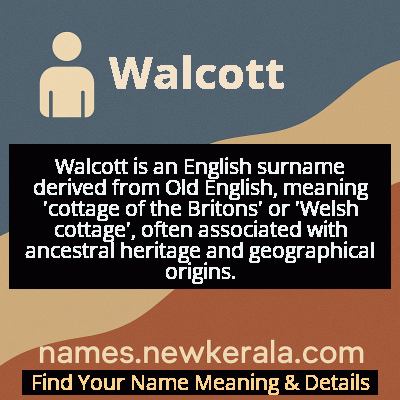Walcott Name Meaning & Details
Origin, Popularity, Numerology Analysis & Name Meaning of Walcott
Discover the origin, meaning, and cultural significance of the name WALCOTT. Delve into its historical roots and explore the lasting impact it has had on communities and traditions.
Name
Walcott
Gender
Male
Origin
Christian
Lucky Number
4
Meaning of the Name - Walcott
Walcott is an English surname derived from Old English, meaning 'cottage of the Britons' or 'Welsh cottage', often associated with ancestral heritage and geographical origins.
Walcott - Complete Numerology Analysis
Your Numerology Number
Based on Pythagorean Numerology System
Ruling Planet
Uranus (Rahu)
Positive Nature
Strong sense of order, loyal, practical, and disciplined.
Negative Traits
Stubborn, overly serious, rigid, and prone to feeling restricted.
Lucky Colours
Blue, gray.
Lucky Days
Saturday.
Lucky Stones
Blue sapphire.
Harmony Numbers
1, 7, 8.
Best Suited Professions
Managers, engineers, accountants, organizers.
What People Like About You
Dependability, discipline, practicality.
Famous People Named Walcott
Derek Walcott
Poet/Playwright
Awarded the 1992 Nobel Prize in Literature for poetic works exploring Caribbean culture and postcolonial identity
Theo Walcott
Footballer
English professional footballer who played for Arsenal and England, known for his exceptional speed and scoring ability
William Walcott
Artist
Celebrated botanical illustrator whose detailed natural history drawings contributed to scientific understanding in the Victorian era
John Walcott
Cricketer
Professional cricketer for Worcestershire County Cricket Club who made significant contributions to English county cricket
Name Variations & International Equivalents
Click on blue names to explore their detailed meanings. Gray names with will be available soon.
Cultural & Historical Significance
Extended Personality Analysis
Individuals with the Walcott name are often characterized by a unique blend of creativity and practicality that reflects their name's dual heritage. The 'cottage' element suggests groundedness, domestic wisdom, and appreciation for simple comforts, while the 'Welshman' component hints at artistic sensibility, storytelling tradition, and cultural adaptability. Walcotts typically demonstrate strong observational skills and attention to detail—qualities evident in both Derek Walcott's poetic imagery and William Walcott's scientific illustrations. They often possess what might be called 'borderland intelligence': the ability to navigate different cultural contexts and synthesize diverse perspectives. This makes them excellent mediators, innovators, and bridge-builders in both personal and professional settings. Family and heritage tend to be important to Walcotts, who often maintain strong connections to their roots while embracing contemporary opportunities. Their practical creativity frequently manifests in fields like writing, education, design, or community leadership, where they can apply both imaginative vision and hands-on implementation. The resilience implied by their border origins often translates into personal fortitude and the ability to adapt to changing circumstances while maintaining core values and identity.
Modern Usage & Popularity
In contemporary naming practices, Walcott maintains a distinctive presence that balances historical depth with modern appeal. As a surname, it continues its centuries-old tradition, particularly among families with English or Welsh ancestry in the United Kingdom, United States, Canada, and Australia. The name gained increased visibility through prominent figures like Nobel laureate Derek Walcott and footballer Theo Walcott, introducing it to broader audiences worldwide. As a given name, Walcott remains relatively rare but has seen gradual increase among parents seeking sophisticated, surname-style names with literary and historical resonance. Its usage patterns reflect broader trends favoring distinctive yet established names that offer both individuality and heritage connections. In the digital age, Walcott maintains a consistent online presence through genealogical research, social media, and professional networks, demonstrating its ongoing relevance. The name's appeal lies in its combination of aristocratic English sound with working-class origins, creating an interesting tension that many modern namers find compelling. While not among the most popular surnames, Walcott's steady usage and cultural recognition ensure its continued presence in the naming landscape.
Symbolic & Spiritual Meanings
Symbolically, Walcott represents the profound connection between dwelling and identity, serving as a metaphor for how we construct our selves from the materials of our environment and heritage. The 'cottage' element symbolizes shelter, craftsmanship, and the creation of personal space, while the 'Welshman' designation represents cultural otherness, artistic tradition, and the wisdom that comes from navigating different worlds. Together, these elements create a rich symbolic tapestry of border-crossing and home-making—the eternal human dance between exploration and settlement. The name evokes the alchemy that transforms simple dwellings into repositories of memory and meaning, much like how ordinary lives accumulate significance through experience and relationship. In a broader sense, Walcott symbolizes cultural synthesis and the creative possibilities that emerge when different traditions meet and interact. It represents the idea that our most meaningful identities often form in transitional spaces—the borderlands between cultures, the thresholds between past and future, the intersections where different ways of knowing converge. This symbolic richness makes Walcott not just a name but a narrative about belonging, creativity, and the ongoing construction of meaning in human experience.

